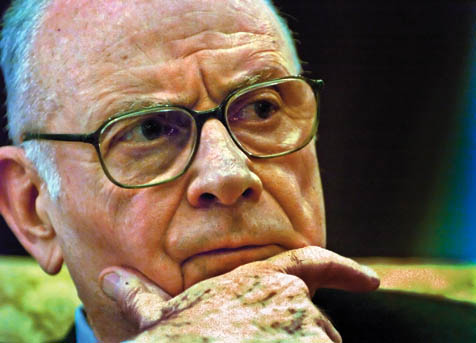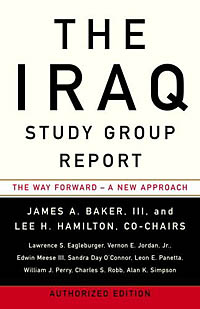Homeland Security Adviser Lee Hamilton on Iraq, Iran, and Pakistan
Measuring Success

Lee Hamilton has one of the most interesting and impressive resumes in Washington. A former Democratic congressmember from Indiana, he was the vice chair of the 9/11 Commission and co-chaired the Iraq Study Group (also known as the Baker-Hamilton Commission). He is now the director of the Woodrow Wilson International Center for Scholars in Washington, D.C. We recently spoke by telephone.
The Baker-Hamilton Report enjoyed broad public support when it was released. But the Bush administration appears to have more or less ignored it. Why? The report ran counter to what the president wanted to do. The president has sought a military victory, and the primary thrust of our report was for a responsible exit. But I think the report changed the nature of the debate. There had been an unrelenting stream of optimistic statements coming from the White House. After the report came out, they began to recognize the problems more realistically.
What do you think is the administration’s long-term plan for Iraq beyond the surge? Does it have one? Well, they haven’t spelled it out. They clearly have downgraded their objectives from when they first went into Iraq, but they’ve been very careful not to spell out what they consider “success,” which is the word the president uses now, instead of “victory.”

Senator Joseph Biden, among others, has called for a confederation in Iraq, with semi-autonomous regions for the Kurds, Sunnis, and Shi’ites, and an oil-sharing agreement between all three. Is this more realistic than a unified Iraq? Well, it would run counter to what all of the Iraqi leaders have said repeatedly. They do not want to partition the country. That comes from President [Jalal] Talabani, [Prime Minister Nouri] al-Maliki, and all the others. The Iraq Study Group view on it was that it’s possible the country might move in that direction, but it ought not to be imposed by the United States.
Could the Baker-Hamilton Report be wrong? What if there is no responsible exit from Iraq? We said in the report that there are no good options. You do not want chaos, and you do not want Al Qaeda establishing a sanctuary. I don’t think it’s clear at this point that the long-term prospects are strong for a stable Iraq. I think those of us on the Iraq Study Group say a responsible exit is one that is not immediate, that does not permit Iran to take over Iraq, and tries for a reasonable degree of stability.
Has the political debate over Iraq changed since the report was released? The whole framework has changed. Today, the debate on Iraq is one question, really: How quickly do you remove the American forces? The president acknowledges that American forces have to be removed, and he’s put forward a plan to do it. The Democrats want him to do it faster. That’s a very different debate than the one we were having just a few months ago. I don’t think that debate’s reversible. That is, the question is not whether America should withdraw. We are withdrawing. The question is at what rate. There are clear differences there, but I don’t know anyone who’s argued convincingly for a precipitous withdrawal.
On November 27th, the Bush administration is holding a conference in Annapolis Maryland with Israeli and Palestinian leaders. In the Baker-Hamilton report, and in a recent public letter to the president, you argue that a resolution to the Israel-Palestine conflict is – or should be – central to our foreign policy. What would that resolution look like, and what are the prospects for the Annapolis conference? Well, most recently the administration downgraded the title – it’s no longer a conference, it’s a meeting. It looks at this point as if the content of the meeting is going to be fairly thin. The Palestinians want specifics, and the Israelis prefer vagueness with regard to the principle issues. Probably the best that can be done here is avoiding failure. A failure would almost certainly mean a renewal of violence, I think.
By principle issues, you mean an independent Palestinian state on Gaza and almost all of the West Bank, a negotiated settlement on Jerusalem, and some kind of agreement with regard to Palestinian refugees? Well that would be an excellent result. I would like to see [the Israelis and Palestinians] agree on two states that are based on the lines of 1967. Everybody acknowledges that there would have to be some modifications, some land swaps. I’d like to see progress on Jerusalem, with two capitals and the Israeli neighborhoods under Israeli sovereignty and the Arab neighborhoods under Palestinian sovereignty. There would have to be special arrangements with the Old City, with each side controlling their holy places. And, finally, a resolution to the refugee problem that is consistent with a two state solution. You have to address the Palestinian’s deep sense of injustice, but you also have to address the very deep sense of insecurity in Israel.
You’re talking about the right of return for estimated 4 million Palestinians expelled from Israel. That might be the toughest issue. The Israelis are not going to accept a large number of Arabs coming back into Israel. I think everybody basically acknowledges that. So the question is, how do you get them meaningful financial compensation and resettlement assistance? I’d like to see all this, but I don’t think it’s going to happen. They’re not going to get that far. I think the hope is that you get the start of an extended process.
How likely is a preemptive strike on Iran by (a) the U.S., (b) Israel, or (c) a joint operation? Well there are three options. There’s acquiescence – just accept that Iran is going to be a nuclear-armed power. I don’t think anyone in Washington accepts that option. The second option is a military strike:. Iran could do significant damage to the U.S., and to the world oil market. So the military solution is not attractive. How this plays out will depend on the president and how he analyzes the intelligence, and how he feels about it sometime next year. The third option is to negotiate. That may be the most promising, but it’s also the most complex. It requires coordination with friends like Germany and some of our most difficult relations, like Russia and China.
So, will we bomb in the next few weeks? No. [The administration] is not going to take the military option off the table; it will depend on how the intelligence reports play out in the next few months. It’s a serious, dicey situation.
We’re increasingly hearing that Pakistan represents a more serious threat than Iran, because of its nuclear arsenal, because of its deeply conservative Pushtun population, and because of the current unrest there. What’s your take? I’ve never accepted the view that the alternative to [Pakistani President Pervez] Musharraf is a Muslim radical. I know Musharraf says that, but the so-called radicals in Pakistan have never garnered more than 11 or 12 percent of the vote:. This constant threat that Musharraf makes that ‘If I’m not here, the radicals are going to have their finger on the nuclear trigger,’ which has fixated the United States – I don’t think it’s a fact. Obviously you can’t ignore the risk, but I don’t think it’s likely. We have to insist on elections, we’ve got to move the country to openness and legitimacy as much as we can. I think we have to make clear to Musharraf that our relationship is going to fundamentally change unless there is a return to democracy.
Do you think the administration’s heavy diplomatic and financial assistance to Musharraf has been a mistake? I don’t think they’ve used it strongly enough for leverage. We’ve put a huge amount of money into Pakistan in the last thirty or forty years, and ten billion or so under the Bush administration, and haven’t gotten too much to show for it. I think it’s unacceptable to the United States to have Al Qaeda reconstituting a sanctuary in Pakistan. I take the view that if Musharraf will not remove that sanctuary [by force], we should. There needs to be much tougher line on Musharraf.
Before I let you go, I’d feel remiss if I didn’t ask about the fact that an alarmingly large percentage of Americans believe that there was a 9/11 conspiracy of one sort or another. Have you gleaned any special insight over the years into why this might be? Well, there are a significant number of American people who just flat out don’t believe the government on anything, and any government commission. And there’s another element that is strongly anti-Bush. I of course reject the view that our government was responsible for the attacks of 9/11, but that’s the point of view of more people than you might think. I get it at most public appearances I make. I was in Cincinnati last night and I got it there.
Is it frustrating to come across these questions? Well yes, it is a little frustrating. But it’s not surprising. There’s just an awful lot of Americans out there who don’t believe government officials or government commissions. Think we’re all a bunch of liars. You can’t persuade those people otherwise. I’ve tried it unsuccessfully a few times. But, you know, you do the best you can.
4•1•1
Lee Hamilton will deliver a free lecture, Time for a Course Correction: American Foreign Policy after Iraq, at UCSB’s Campbell Hall on Sunday, December 2, at 3 p.m. For more information, call 893-2317 or visit cappscenter.ucsb.edu.



